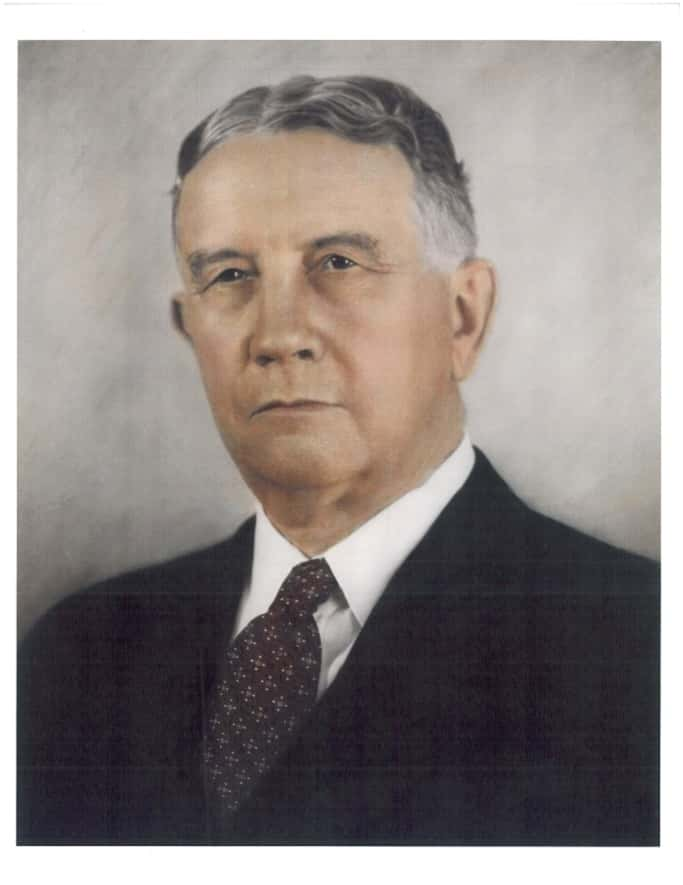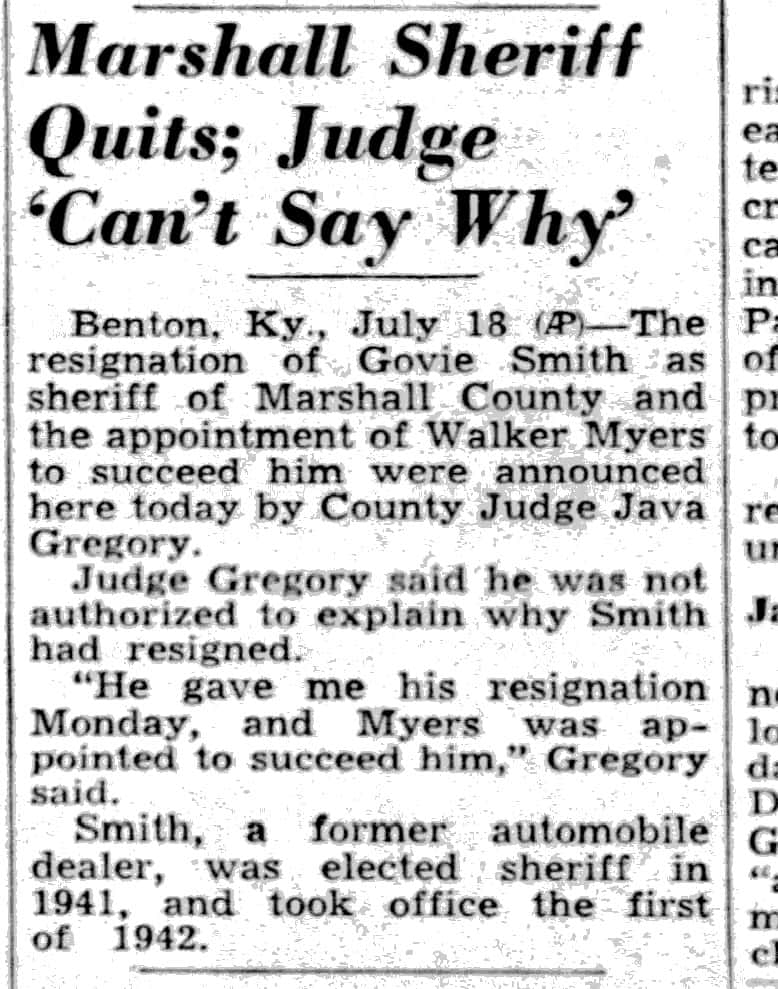
Marshall County’s Roadhouse Days
Written by Justin D. Lamb

Circuit Judge Joe L. Price was the first county official to demand an end of roadhouses in Marshall County.
(Courthouse Courtroom Collection)
“In my mind road houses are one of the greatest menaces to law and order in Marshall County,” proclaimed Circuit Judge Joe L. Price as he opened the 1941 session of Circuit Court. “They are a gathering place for those who have no respect for law or anything. They have become nothing more than a menace to this community and I aim to stop them. This county has voted dry and it is an offense to sell liquor here,” Judge Price concluded. With those words, Judge Price unofficially declared war on the illegal sale of alcohol and began the long process of cleaning up Marshall County.
Price’s concerns were justified as corruption was rampant during this time. In 1933, federal prohibition was repealed and bars and honky-tonks began to open throughout Marshall County. By 1937, Marshall County passed a local option law banning the sale of alcohol. However, this law did little to curb the sale of booze and by the late 1930s, several illegal roadhouses, honky-tonks, and speak-easys were in operation complete with slot machines, pool tables, and other sources of gambling. With the arrival of TVA workers to construct Kentucky Dam in 1938, the roadhouses received a new customer base and proprietors of these establishments saw an increase in illegal revenue.
Many began to demand enforcement of the law and calls were made for the sheriff’s office and local police departments to shut down the illegal establishments, but bribes were given to officers and elected officials to look the other way in order to keep the establishments in full operation. A few small raids were conducted to quiet the public, but no large scale effort was made to shut down the roadhouses.
That all begin to change in 1941, when a violent incident fueled the calls for the roadhouses to be stamped out. Shortly after midnight on Sunday, January 26, 1941, Mable Bradley of Mayfield and her boyfriend Richard Farnsley were leaving the Shady Rest Roadhouse located between Gilbertsville and Calvert City when they noticed three men enter the building.
As Farnsley started up his car, screams were heard coming from inside the roadhouse. Both Farnsley and Bradley ran back into the roadhouse and discovered two of the men beating the roadhouse proprietor, Lester Connour, with a black jack and the third holding Mrs. Connour at knifepoint while she struggled and screamed for help.
Farnsley pulled out his pistol and fired three shots into the ceiling in hopes of scaring the men away, but one of the men sprang toward Farnsley knocking him over the head with a blackjack. The man grabbed Farnsley’s gun and fired shots toward the back of the room hitting Mable Bradley in the stomach. The gunman then chased Mable Bradley across the room and threatened to finish her off as she begged for her life. Bradley’s life was spared as all three men made an escape and the sheriff’s office was immediately notified. Bradley was rushed to a hospital in Mayfield where she later recovered.
The sheriff’s office investigated the crime and learned the men made away with $37 and the sheriff seized the gun used in the shooting as well as a knife and a blackjack as evidence. A manhunt was organized and by mid-morning on January 26, all three men were arrested and lodged at the Marshall County jail. At the examining trial, all three suspects were brought before County Judge John D. Hall and released on a $300 bond.
On the week of February 11, 1941, charges against the three men were reduced from attempted murder and armed robbery to breach of the peace. All three men pleaded guilty, paid a fine, and were released. The Shady Rest Roadhouse was ordered to be closed, but a few months later, it was back in operation.
The public became outraged at the light sentence received by those guilty in the Shady Rest Roadhouse incident and with the 1941 local county elections taking place only a few months later, the roadhouse problem took center stage as the primary issue of the political season.
A few months later, another violent incident took place when merchant Felix Bailey, who owned a lunchroom diner in Benton, was attacked in his restaurant by two unknown assailants. Upon investigation, it was discovered that Bailey also ran an illegal pool hall in the back of his restaurant and the beating took place after Bailey had addressed the Benton City Council where he told the members that he would no longer continue to pay both city taxes and “hush money” to the Benton City Police Department.
By the summer of 1941, the roadhouse issue in Marshall County could no longer be ignored by county officials. The public demanded action to stamp out the the illegal booze and gambling and disorder that went with it.On May 19, 1941, a special session of the Grand Jury was called following an editorial that appeared in the Marshall Courier which stated that 51 places in Marshall County were engaged in illegal alcohol and gambling activities and that several county and law enforcement officials were accepting bribes to protect these illegal establishments. Following the appearance of the story, the editor of the Marshall Courier claimed to have been intimidated by roadhouse operators and one county official who was tied in with a roadhouse. The Grand Jury investigated the intimidation claim, but during its investigation, the editor abruptly changed his story and refused to disclose the names of the intimidator or any of the illegal establishments.
Over 100 more witnesses were called to testify during the special session of the grand jury, but Commonwealth Attorney Holland Bryan and County Attorney Ben T. Cooper ran into several roadblocks as witnesses refused to testify or to cooperate with the investigation. After three days, the session closed with only 47 minor indictments against 7 people for operating illegal roadhouses, permitting gambling, and selling alcohol to minors. Additionally, the Neal Owens, night patrolman for the Benton Police was indicted for accepting bribes from roadhouse proprietors. Owens was later acquitted and promoted to Benton Police Chief. Another city official, Benton City Judge Pomp Barnes was also indicted for performing his duties as city judge while intoxicated. In a closing statement, the Grand Jury foreman reported that heavier indictments could have been handed down if witnesses who appeared would have cooperated and given more information.

The special session of the Grand Jury closed just as the political season opened in Marshall County. As candidates began to announce their campaigns for public office in the summer of ‘41, the roadhouse issue played a central part in the sheriff and county judge’s race. The political rhetoric was as hot the summer heat and a series of debates were hosted throughout the campaign. The Tribune Democrat commented, “The heat of the political campaign reached a new high as the candidates for office in the Democratic primary shot off the big guns of oratory to launch what many observers believe will be the hottest and loudest public speaking campaign in many years.”
Incumbent County Judge John D. Hall, who was first elected in 1937, had led a successful administration as County Judge. His administration had purchased new road machinery and had built several new roads and bridges and had maintained the upkeep of several existing roads throughout the county. In his first term, Judge Hall also implemented a plan which considerably paid off the county’s debt and Hall promised to have the remaining debt paid in full by July 1942. However, these accomplishments did little to appease the voters, as Judge Hall was seen as soft on the roadhouse issues in county court especially after he had reduced the charges of the three men involved in the Mable Bradley roadhouse shooting just a few months prior. Judge Hall’s two opponents used this perception by the voters to their advantage
County Jailer Java Gregory announced his intention to challenge Judge Hall and he nailed home the roadhouse issue. Gregory promised the voters if he was elected County Judge, he would draw a hard line against roadhouses and any other illegal activity in the county. Former County Judge Homer H. Rayburn also joined the race and promised the voters that he would “do his utmost to rid the county of any unmoral conditions that exist.”
The sheriff’s race became heated as well. As the top law enforcement official in the county, a great deal of pressure was put on the sheriff’s candidates to put an end to the roadhouse problem if they were elected. Sheriff Jack Edwards was unable to seek a second consecutive term as mandated by Kentucky law at the time, so the field was wide open and three candidates, former sheriff Burnett Holland, city councilman J. Govie Smith, and former Benton Mayor Will Ely threw their hats in the ring for the job.
Smith and Holland both pledged to run a department that would forever stamp out roadhouses in Marshall County. Ely, on the other hand, was very vague on where he stood, and as the campaign rolled on, Holland pointed out to the voters that Ely had yet to take a stand on the roadhouse issue. Meanwhile, Smith questioned Holland’s inability to rid the roadhouses during his first term as sheriff and Smith argued that the roadhouse problem began during Holland’s first term as sheriff and told the voters it was time for a new man to lead the fight against the “corruption of our county.” Holland countered by defending his record as sheriff and pledged that if he given a second term he would not “buy in or sell out” to the roadhouse proprietors as the city council, in which Smith served, had.
On Saturday, August 2, voters went to the polls to finally cast their ballots as the fiery campaign drew to a close. Several gathered around the courthouse in Benton under the large shade trees to get relief from the August heat as the election commissioners gave precinct by precinct results on the balcony of the courthouse. When the votes were finally tallied, Java Gregory was narrowly elected County Judge and J. Govie Smith became sheriff. After the victory celebration was over, the long work began of making good on campaign promises and ridding Marshall County of the corruption and roadhouse problem that had plagued the county.
During his first year, Sheriff Smith made several successful raids against prominent roadhouse establishments much to delight of the electorate. However, in July 1944, Sheriff Smith abruptly resigned after reports that he was receiving kickbacks from roadhouse proprietors. It must be noted that these claims were never investigated and Sheriff Smith was never indicted or convicted of any wrongdoing, but his abrupt resignation left many unanswered questions.

Courtesy of the Associated Press
Following the resignation of Sheriff Smith, County Judge Java Gregory placed a call to former deputy sheriff Walker Myers who had recently moved to Detroit. Myers had served as deputy during Sheriff Smith’s first year and had helped conduct several raids on roadhouses. Myers left the Sheriff’s office in early 1943 and moved to Detroit seeking better economic opportunity.
Myers was offered the vacant sheriff’s position which he accepted and was later elected to a full term. By the end of his term in 1950, nearly every roadhouse, honky-tonk, and speakeasy were phased out of existence.
